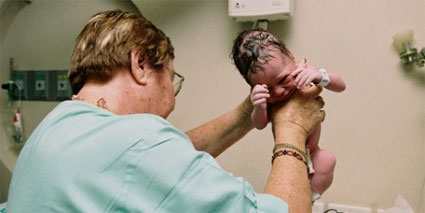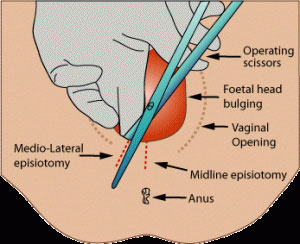Are you ready for fatherhood? You can take an active part in the birth of your child. Read on to know how to support your partner in labour. Sunidhi talks about her labour experience and she sure is overwhelmed with her achievement. She thinks that her husband was the best support she could have ever asked for. Sunidhi and her husband attended Lamaze classes to make themselves ready for the wonderful experience of giving birth to their child. Sunidhis husband held her hand through out the labour. He was a bit nervous, a bit excited and a bit anxious. He gave her a back massage and helped her to concentrate on pushing and breathing. Sunidhi was overjoyed to see the tears in his eyes when her baby came out. "Without him it could have been very difficult," she exclaims. When a mother starts experiencing her labour pain she needs nothing but the support of her loved ones. A partner can be a huge support at the time of labour. Here is the guide for all dads-to-be out there to be a perfect labour partner. In this articleLearn how to support your partner during labourSupporting your partner in labourSupporting your partner while delivering a babyLearn how to support your partner during labour If you are going to become a dad for the first time and experiencing butterflies in your stomach, do not worry. It is okay to feel nervous about the delivery of your child. You need to educate yourself what you can do to support your partner during labour. Enrolling yourself for childbirth classes along with your wife could help you to ease the tension. Fathers are often asked to accompany their wives at every session. Childbirth classes such as Lamaze classes train dads about labour and delivery. Birthing classes make dads ready to take part in the process of childbirth so that they can offer physical and emotional support to the mother. Browse the internet, read books and speak to your doctor or midwife. You will find a lot of footage on child birth. Watch a few videos and make yourself mentally prepared to assist the birth of your child. But remember, each pregnancy and labour experience is unique. Talk to your friends, colleagues and relatives if they have any childbirth stories to share with you. Just being in the labour room with your partner will be a huge support for your partner. Supporting your partner in labour Understand the three stages of labour. The first stage of the labourfirst stage may last for a few days or weeks. In the active stage, mum-to-be will notice increased contractions. Your partner needs you the most at this time. Encourage her that she is doing really well. Try to distract her by playing cards or board games. A soft massage or acupressure can be uplifting for her at this stage. Help her to relax. Be with her. In transition stage contractions will be more intense. She may experience severe lower back pain and nausea. Keep her reminding that this is the shortest period of labour. Sit beside her, hold her hand, and give her a warm hug. Rub her feet and back gently. comprises of three phases - early, active and transitional. The Supporting your partner while delivering a baby In the second stage a mother would feel the strong urge to push. She will experience exhaustion, a burning sensation and pain while the babys head crowns out of the vaginal passage. Help her to take a comfortable position. Your partners health care provider will assist you to know the most comfortable position during contractions. Squatting position is considered the most comfortable position while delivering a baby. Utter encouraging words through out the delivery such as you can do it, you are doing it great, well done. Persuade your partner to take rest between contractions. A mother may hold her breathe while pushing a baby. Keep her reminding to breathe after every few seconds. Keep in mind following tips and be a fantastic labour partner. Keep asking your partner whether she is comfortable or not Discuss your partners expectations regarding delivery in advance Rub your partners feet through out labour if she is comfortable Though there will be experienced people such as the midwife, remember your partner needs you the most Try to distract your partners mind in the early labour such as watching a DVD or playing scrabble Take a short break and return to the labour room if you are scared to see your partner in labour pain Get help of a friend, relative or doula if you want to share your responsibility but discuss things with your partner in advance Be there with her to emotionally and physically support her Stage three is the final stage which ends with the delivery of your most awaited bundle of joy. Embrace your baby and hold it to her mom. Congratulations! You are a dad now. Feeling euphoric? You will realise that tears are rolling down your cheeks. Live the ecstatic moment to the fullest. Celebrate your newly found fatherhood.
Are you ready for fatherhood? You can take an active part in the birth of your child. Read on to know how to support your partner in labour. Sunidhi talks about her
labour experience and she sure is overwhelmed with her achievement. She thinks that her husband was the best support she could have ever asked for. Sunidhi and her husband attended
Lamaze classes to make themselves ready for the wonderful experience of giving birth to their child. Sunidhi's husband held her hand through out the
labour. He was a bit nervous, a bit excited and a bit anxious. He gave her a back massage and helped her to concentrate on pushing and breathing. Sunidhi was overjoyed to see the tears in his eyes when her baby came out. "Without him it could have been very difficult," she exclaims.
When a mother starts experiencing her
labour pain she needs nothing but the support of her loved ones. A partner can be a huge support at the time of
labour. Here is the guide for all dads-to-be out there to be a perfect labour
partner.
Learn how to support your partner during labour
If you are going to become a dad for the first time and experiencing butterflies in your stomach, do not worry. It is okay to feel nervous about the
delivery of your child. You need to educate yourself what you can do to support your partner during
labour. Enrolling yourself for
childbirth classes along with your wife could help you to ease the tension. Fathers are often asked to accompany their wives at every session.
Childbirth classes such as Lamaze classes train dads about
labour and
delivery. Birthing classes make dads ready to take part in the process of childbirth so that they can offer physical and emotional support to the mother.
Browse the internet, read books and speak to your doctor or midwife. You will find a lot of footage on
child birth. Watch a few videos and make yourself mentally prepared to assist the birth of your child. But remember, each pregnancy and labour experience is unique. Talk to your friends, colleagues and relatives if they have any childbirth stories to share with you. Just being in the
labour room with your partner will be a huge support for your partner.
Supporting your partner in labour
Understand the
three stages of
labour. The first stage of the
labourfirst stage may last for a few days or weeks. In the active stage,
mum-to-be will notice increased contractions. Your partner needs you the most at this time. Encourage her that she is doing really well. Try to distract her by playing cards or board games. A soft massage or acupressure can be uplifting for her at this stage. Help her to relax. Be with her.
In transition stage contractions will be more intense. She may experience severe lower back pain and nausea. Keep her reminding that this is the shortest period of
labour. Sit beside her, hold her hand, and give her a warm hug. Rub her feet and back gently. comprises of three phases - early, active and transitional. The
Supporting your partner while delivering a baby
In the
second stage a mother would feel the strong urge to push. She will experience exhaustion, a burning sensation and pain while the baby's head crowns out of the vaginal passage. Help her to take a comfortable position. Your partner's health care provider will assist you to know the most comfortable position during contractions. Squatting position is considered the most comfortable position while delivering a baby.
Utter encouraging words through out the
delivery such as 'you can do it', 'you are doing it great', 'well done.' Persuade your partner to take rest between contractions. A mother may hold her breathe while pushing a baby. Keep her reminding to breathe after every few seconds. Keep in mind following tips and be a fantastic
labour partner.
- Keep asking your partner whether she is comfortable or not
- Discuss your partner's expectations regarding delivery in advance
- Rub your partner's feet through out labour if she is comfortable
- Though there will be experienced people such as the midwife, remember your partner needs you the most
- Try to distract your partner's mind in the early labour such as watching a DVD or playing scrabble
- Take a short break and return to the labour room if you are scared to see your partner in labour pain
- Get help of a friend, relative or doula if you want to share your responsibility but discuss things with your partner in advance
- Be there with her to emotionally and physically support her
Stage three is the final stage which ends with the delivery of your most awaited bundle of joy. Embrace your
baby and hold it to her mom. Congratulations! You are a dad now. Feeling euphoric? You will realise that tears are rolling down your cheeks. Live the ecstatic moment to the fullest. Celebrate your newly found
fatherhood.
































